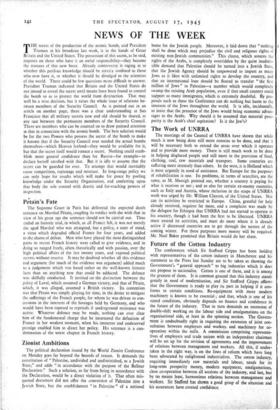Future of the Cotton Industry
The conferences which Sir Stafford Cripps has been holding with representatives of the cotton industry in Manchester and his statement to the Press last Sunday are to be taken as showing the Government's " general approach " to big industries which it does not propose to nationalise. Cotton is one of these, and it is among the greatest of them. It is common ground that this industry stands greatly in need of modernisation, and Sir Stafford Cripps affirms that the Government is ready to play its part in helping if it con- forms to certain conditions. Re-equipment with more modern machinery is known to be essential ; and that, which is one of his stated conditions, obviously depends on finance and confidence in the future of the industry. That in turn demands an extension of double-shift working on the labour side and amalgamations on the organisational side, at least in the spinning section. The Govern- ment is undoubtedly right in requiring the extension of joint con- sultation between employers and workers and machinery for co- operation within the mills. A commission comprising representa- tives of employers and trade unions with an independent chairman will be set up for the revision of agreements and the improvement of relations between management and workers. All this, if under- taken in the right way, is on the lines of reform which have long been advocated by enlightened industrialists. The cotton industry, requiring immediately raw materials and labour, needs for its long-term prosperity money, modern equipment, amalgamations, close co-operation between all sections of the industry, and last, but by no means least, harmonious relations between management and workers. Sir Stafford has shown a good grasp of the situation and his assurances have created confidence.


























 Previous page
Previous page